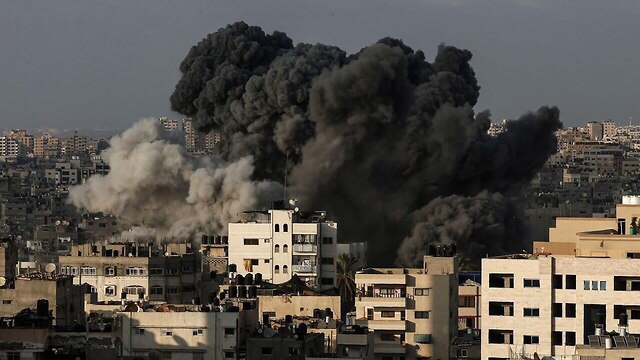
With Iran held in check by Biden hopes, Israel grabs chance to hit hard in Syria
With US in transition, the IDF sees Tehran as less likely to retaliate, and is making hay by expanding and intensifying its air campaign against Iranian forces across the border
By Judah Ari Gross 14 Jan 2021, 1:23 pm
Over the past two and a half weeks, Israel has reportedly conducted at least four rounds of airstrikes on Iran-linked sites in Syria, including a major bombardment in the predawn hours of Wednesday morning according to media outlets there, in a major step up from the normal scope and frequency of attacks.
Wednesday’s attack was a major operation against Iran’s efforts to establish a permanent military presence in the country, one of the largest reported Israeli airstrikes in years, with over 15 sites bombed in eastern Syria some 500 kilometers (300 miles) from Israel, according to Syrian reports.
The bombing was both more intense than normal — in comparison, the Israel Defense Forces said it struck some 50 targets in Syria in all of 2020 — and took place much farther from Israel than most attacks attributed to the Jewish state. The three other rounds of airstrikes in last few weeks took place in areas closer to Damascus and the Syrian Golan.
The IDF had no comment on the late-night strikes, in accordance with its policy to neither confirm nor deny its operations in Syria save for those in retaliation to an attack on Israel from the country.
The significant increase in the frequency and scope of the attacks stems from an assessment by the Israel Defense Forces, shared with The Times of Israel, that Iran is unlikely to retaliate in a major way to these strikes in the short term.
In general over the past year, Iran has not responded to Israeli airstrikes — either not finding a way to do so or being stopped by Israel from doing so — and currently Tehran appears to be preparing to enter into negotiations with US President-elect Joe Biden’s incoming administration, which would be more difficult were it to be actively engaged in fighting with Washington’s key ally in the region. While Iran takes a wait-and-see approach, Israel is taking advantage.
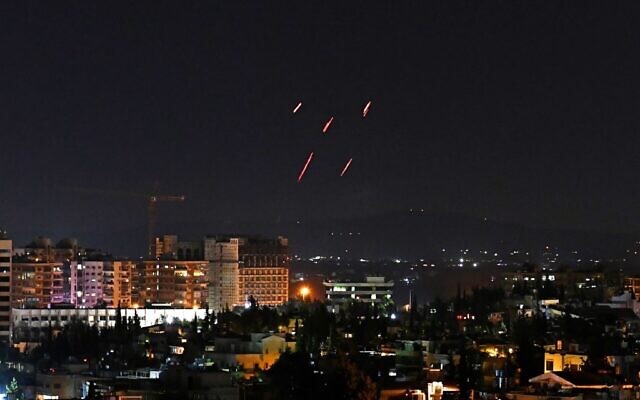
Syrian Air defenses respond to alleged Israeli missiles targeting south of the capital Damascus, on July 20, 2020. (AFP)
Even if the frequency of IDF strikes decreases in the coming weeks, it would more likely be due to operational restrictions than the incoming Biden administration trying to curb Israel. The same window of opportunity is expected to remain as long as Tehran holds out hopes of talks with the new president, allowing Israel to continue its efforts in Syria, which are intended to keep Iran from entrenching itself militarily in the country and using it to move weapons that would threaten the Jewish state.
“The Biden administration won’t stop Israel from striking [in Syria],” Amos Yadlin, a former Military Intelligence chief, told the Times of Israel.
According to Israeli officials, the campaign against Iran in Syria has been on the whole successful, stymieing Tehran’s plans for the country and largely keeping the bulk of its forces further from Israel’s borders.
“They wanted to shape [Syria] in the model of Hezbollah, to have masses of soldiers there, with missiles, with the ability to strike Israel, to exhaust Israel,” Minister Tzachi Hanegbi told the Kan broadcaster Wednesday.
“In the past four years… they failed to turn Syria into something like the second Hezbollah. They tried to build there a military force and Israel — time after time — destroyed those attempts and that infrastructure. They haven’t given up, they haven’t quit, but they have failed,” he said.
Last month, IDF Chief of Staff Aviv Kohavi made a similar claim, telling reporters in a year-end briefing that the IDF has noted a marked drop over the previous two years in the number of Iran-backed fighters in Syria, an increase in the number of Iranian military bases being closed in the country, and a significant decrease in the amount of weaponry being transported into and through Syria.
“Iranian entrenchment in Syria is in a clear trend of slowing down as a direct result of IDF activities, though we still have a way to go to reach our goals on this front,” Kohavi said.
Yet the Islamic Republic has not thrown in the towel and still maintains a significant military presence in the country, even if it is smaller than it desires.
According to Syrian media reports, the targets of the Wednesday strike were primarily weapons warehouses around the Deir Ezzor and Boukamal regions, areas known to contain significant numbers of Iran-backed militias, which are more difficult for Israel to strike due to their greater distance from the border.

QalaatM
@QalaatM
·
Jan 13, 2021
Replying to @QalaatM
E. #Syria: the military Security (Intelligence)’s HQ in #DeirEzzor-city is among the targets bombed today by #Israel. One dead identified so far (from Masyaf). Multiple wounded too.


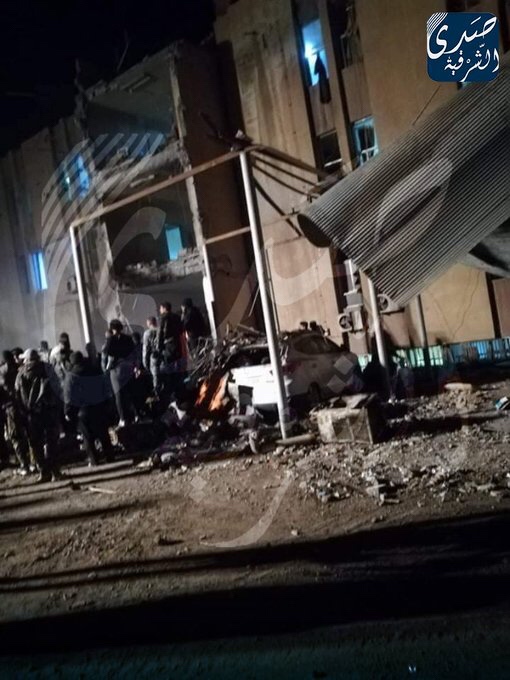

QalaatM
@QalaatM
E. #Syria: more evidence showing aftermath of #Israel|i airstrikes today in #DeirEzzor province:
– ammo warehouse W. of DeZ-city (1)
– informal border crossing with #Iraq, near #AbuKemal (2-3)
Death toll of 50+ (SOHR) is however fabricated.
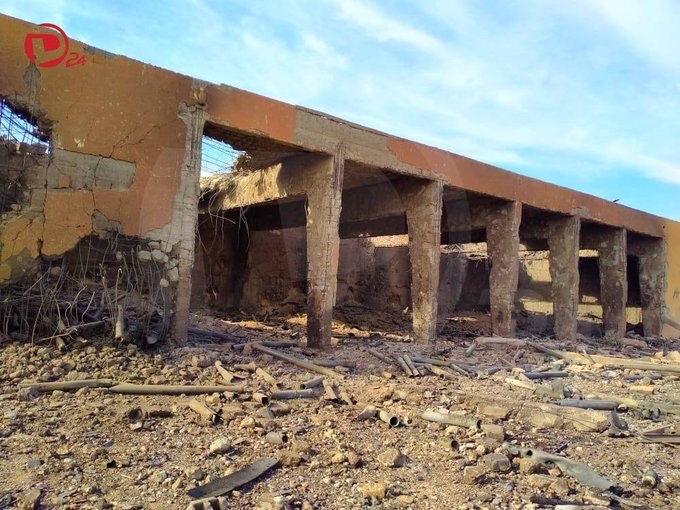

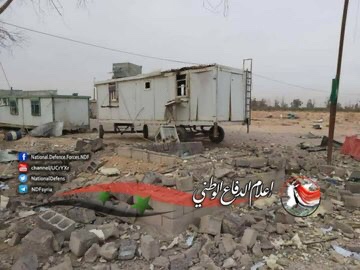
11:06 AM · Jan 13, 2021
34
20 are Tweeting about this
Israeli and Western intelligence officials, as well as Syrian opposition media, have said that these areas are used by Tehran as part of a so-called land corridor to transport weapons from Iran through Iraq into Syria and, in some cases, on to Lebanon, where its most significant proxy, Hezbollah, is based.
Boukamal was also targeted multiple times in 2018 and 2019 in a failed bid to block the construction of the infrastructure likely used to transport missiles into Syria in recent weeks.
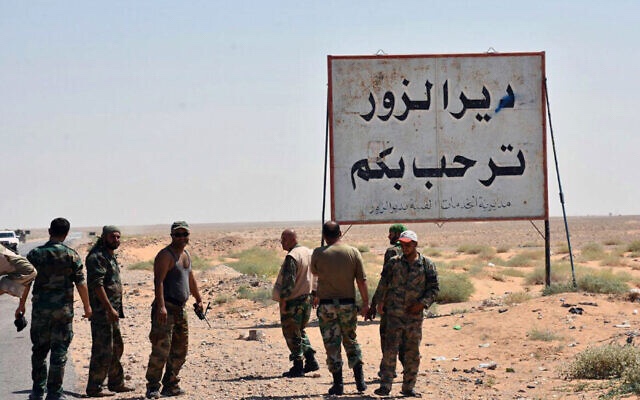
This file photo released Sept. 3, 2017, by the Syrian official news agency SANA, shows Syrian troops and pro-government gunmen standing next to a sign in Arabic which reads, “Deir el-Zour welcomes you,” in the eastern city of Deir el-Zour, Syria. (SANA via AP)
“The other side, as I understand, is not prepared to surrender because they invested a huge fortune and massive resources in the success of Assad and they want to collect their fee from Assad, which is their ability to operate freely from within Syria, which they saved from falling into the hands of the rebels,” Hanegbi said.
According to Omar Abu Layla, a Europe-based activist who runs DeirEzzor24, a pro-opposition media collective with researchers on the ground in eastern Syria, these warehouses contained a particularly large shipment of missiles that had been brought into the area by the Iran-backed Fatimiyeon militia in recent weeks.
In a highly irregular move, a senior US intelligence official confirmed to the Associated Press that Israel was behind the Wednesday strikes. The official said the intelligence behind the attack was provided by the US. It’s unlikely, though, that Israel would launch such a significant raid based solely on American intelligence, based on its standard operating procedure.
More curiously, the official also claimed the warehouses that were targeted were used to transport components that support Iran’s nuclear program — though not that these materials were themselves targeted in the strikes. This is an eyebrow-raising proposition, given the fact that Deir Ezzor was the site of Syria’s own nuclear reactor before it was destroyed by the Israeli Air Force in 2007.
Yadlin, the current head of the influential Institute for National Security Studies, dismissed this claim as “fake news” and said that these were simply not the supply lines used by Iran for its nuclear program.
Asked if the attribution to a senior US intelligence official didn’t lend some credence to the claim, Yadlin told The Times of Israel: “A former senior Israeli intelligence official is saying this report has no logical [basis].”
Nuclear brinksmanship
Recent months have seen rising tensions between Iran and the US and Israel, amid speculation that outgoing US President Donald Trump would use his final week in office to launch a military strike against Tehran.
The US has deployed B-52 heavy bombers to the Middle East, sent an aircraft carrier to the Persian Gulf and sought to diplomatically challenge Iran by releasing intelligence tying the Islamic Republic to the Al-Qaeda terror group earlier this week. The US has also stepped up its sanctions on Iranian entities.
The head of Iran’s military nuclear program, Mohsen Fakhrizadeh, was also killed in November in an attack that was widely attributed to Israel.
In a somewhat subtler move, Mossad chief Yossi Cohen traveled to Washington, DC, this week, meeting with US Secretary of State Mike Pompeo in a public space, prompting widespread speculation on what the two discussed.
Iran, in turn, has taken a number of provocative steps on the nuclear front, announcing that it was beginning to enrich uranium to 20 percent, a major breach of the 2015 nuclear deal, which it has been steadily violating since Trump abandoned the agreement in 2018. On Wednesday, Tehran announced it was also advancing research into uranium metal, a key component of nuclear weapons, with limited civilian uses.
In addition, the Iranian military has staged two large exercises, one focusing on drones and the other on the navy.
Iran also seized a South Korean oil tanker that had been sailing through the Persian Gulf, an apparent act of revenge for some $7 billion in Iranian assets that were frozen by Seoul.
Despite these growing signs of tensions, Hanegbi said Israel did not anticipate some kind of attack in the coming week.
“The [Israeli] assessment is that nothing dramatic will happen during this week,” he said. “This is the calm before the storm.”
The minister, who is considered a close ally of Prime Minister Benjamin Netanyahu, explained that the “storm” would be what comes as the United States negotiates a new nuclear deal with Tehran, saying that if Israel did not feel such an agreement ensured its security, it would attack Iran’s nuclear program.

The exterior of the Arak heavy water production facility in Arak, Iran, 360 kilometers southwest of Tehran, October 27, 2004. (AP Photo)
Biden has publicly stated his intention to rejoin the accord — known formally as the Joint Comprehensive Plan of Action — provided Iran also returns to the terms of the deal and use that agreement as a jumping off point for further negotiations.
Those opposed to the JCPOA, as well as some proponents of it, argue that a simple return to the deal would give up the considerable leverage that Trump’s sanctions regime has achieved. Instead, those people argue, Biden should attempt to negotiate a far stronger deal, one that does not have the expiration dates of the JCPOA, with greater access for international inspectors, and also addressing Iran’s ballistic missile program and malign influence in the region. Supporters of Biden’s plan maintain that a significantly more robust deal is not feasible now, but could be negotiated going forward.
This is the calm before the storm
“If the United States government rejoins the nuclear deal — and that seems to be the stated policy as of now — the practical result will be that Israel will again be alone against Iran, which by the end of the deal will have received a green light from the world, including the United States, to continue with its nuclear weapons program,” Hanegbi said.
“This of course we will not allow. We’ve already twice done what needed to be done, in 1981 against the Iraqi nuclear program and in 2007 against the Syrian nuclear program,” he said, referring to airstrikes on those two countries’ nuclear reactors.
No comments:
Post a Comment